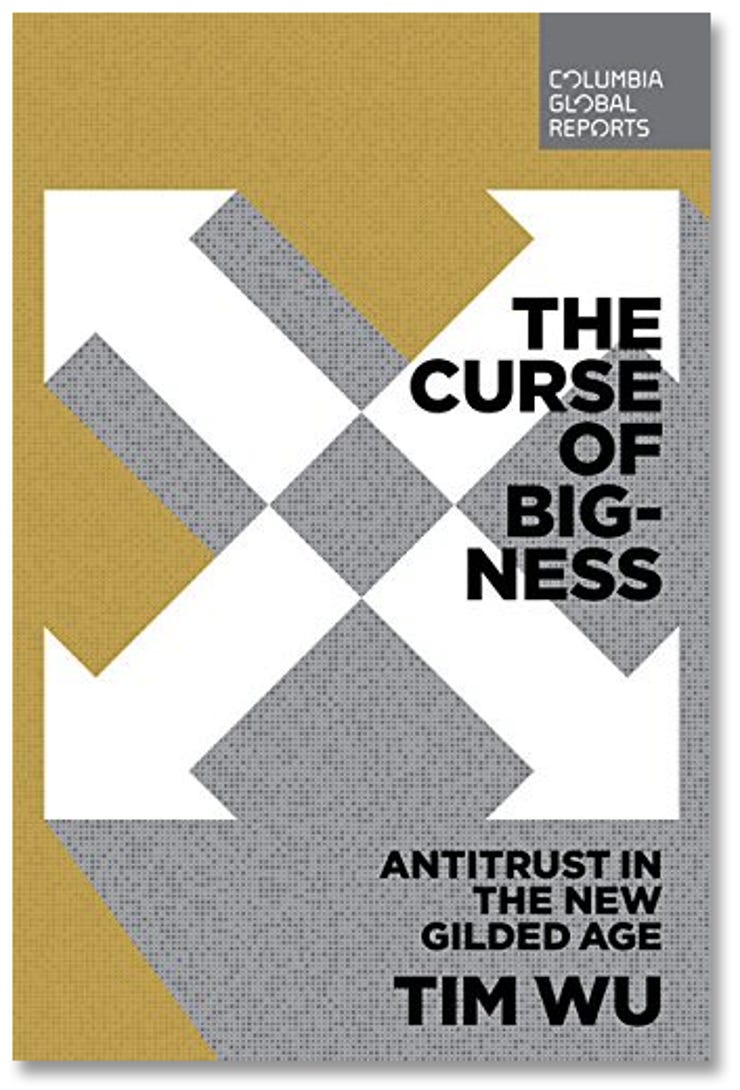The Curse of Bigness, book review: Breaking up should be easy to do


The Curse of Bigness: Antitrust in the New Gilded Age • Tim Wu • Columbia Global Reports • 160 pages * ISBN: 978-0-9997454-6-5 (ebook: 978-0-9997454-7-2) • $14.99
One of the characteristics of the declining turnout at general elections in both the US and the UK is disaffected voters who say it doesn't matter who gets elected because they're all the same. To that, the obvious response is to imagine the difference if a few votes in Florida or Ohio in 2000 had put Al Gore into the presidency before 9/11.
Perhaps even more significant for today's world, Tim Wu writes in his latest book, The Curse of Bigness, was instead president George W. Bush's decision to stop pursuing antitrust actions. The Department of Justice's action in the last big antitrust case, against then-rampaging Microsoft, paved the way for today's giants — Google, Amazon and Facebook. Failing that action, Wu writes, "We'd all be using Bing."
Well, sort of. We'd be using Bing, but it would look like a cluttered 1997 Yahoo!, and it might have stalled at the pre-search directory stage, with Microsoft as gatekeeper for every access to every medium. Whether we'd still have today's pervasive advertising trackers is an exercise for the reader.
In the years since, the unlikely ideological winner has been Robert Bork, best known for failing to win confirmation to the Supreme Court. Bork, in word and litigation, has promulgated the 'Chicago School' views that limit antitrust evaluations to whether consumers pay more. The upshot, as Lina M. Khan wrote last year in a lengthy discussion of Amazon's underestimated power, is that there is now no foundation for considering structural problems of market power when pricing is not directly involved. Where the US once used antitrust law to ensure a thriving ecosystem of small independent businesses, for the last 20 years only the EU has applied that standard to the technology giants.
In the days when Microsoft and AOL could be derailed by a bunch of open networking protocols, or two guys in a Stanford dorm room could up-end a then-dominant company like Yahoo!, it was possible to believe that the internet's equal-access-for-all mythology made antitrust law obsolete. As Khan argued last year and Wu argues here, this is no longer true. We cannot now assume that new monopolies will not survive the next wave of technology. Google is 20 years old; eBay is 25; even Facebook — this week dubbed "digital gangsters" in the DCMS report on fake news — is 15. Facebook was allowed to swallow Instagram, Wu writes, because regulators wrongly held that the two companies were not competitors. Teenagers, switching from the former to the latter, knew that was wrong.
SEE: IT pro's guide to GDPR compliance (free PDF)
Wu ends with recommendations. Develop new and stricter criteria for blocking mergers. Allow public input and challenges. Use existing antitrust law — in the US, the Sherman Act — to take up the big cases the US has abandoned. Break up the large trusts rather than issue consent decrees, which require continuing oversight.
First up: consider breaking up Facebook by forcing it to divest WhatsApp and Instagram. Adopt a proactive market investigations law such as that in the UK. Finally, instead of evaluating every situation by the standard of 'consumer welfare', evaluate corporate conduct by whether it promotes or suppresses competition. The goal, Wu concludes, should be to restore dynamism. Very large corporations, as he argues at the beginning of the book, are rarely innovative unless pushed.
RECENT AND RELATED CONTENT
Facebook broad data collection ruled illegal by German anti-trust office
German antitrust watchdog wants Facebook to obtain explicit user consent before merging data collected from WhatsApp, Instagram, Facebook Analytics, and social buttons with Facebook profiles.
Can Amazon, Facebook, Google be tamed by being forced to share their data?
A major German party thinks mandatory data-sharing with rivals and the public can rein in Big Tech.
ACCC goes after Google, Facebook in the name of fake news and data transparency
The consumer watchdog wants to protect the integrity of news content in Australia by holding digital giants accountable over what is available and shared on their platforms. It also wants regulation and transparency around how they collect and use data.
Satya Nadella: Microsoft's first futurist CEO
Is it time for the tech industry to grow up and realise just how much it affects the world?
Google files appeal of $5 billion EU fine
Earlier this year, the European Commission fined Google for its restrictions on Android device makers and network operators.
Read more book reviews
- The Age of Surveillance Capitalism, book review: Data, privacy and the threat to democracy
- The Lean Product Lifecycle, book review: How to find, and keep, a competitive edge
- Five top tech books for the holiday period
- Antisocial Media, book review: Good intentions gone bad
- It Doesn't Have to Be Crazy at Work, book review: Choose calm instead